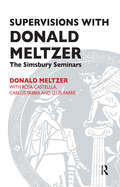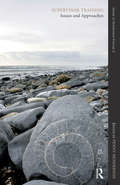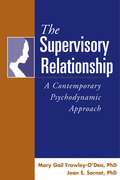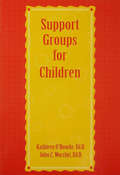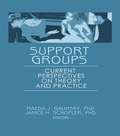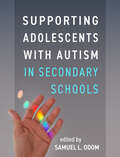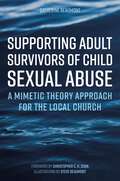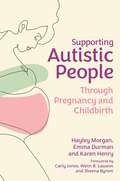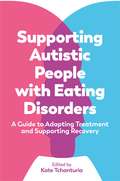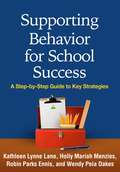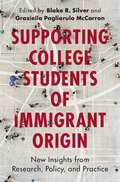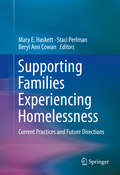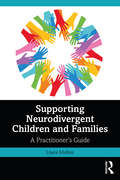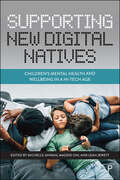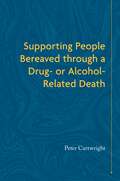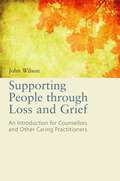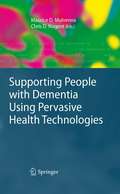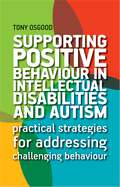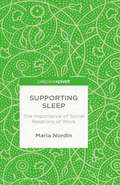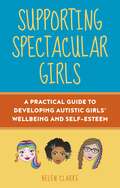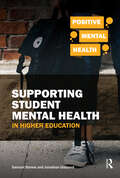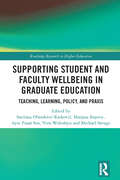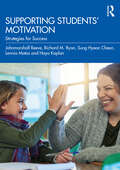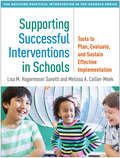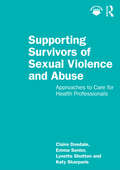- Table View
- List View
Supervisions with Donald Meltzer: The Simsbury Seminars
by Lluís Farré Donald Meltzer Rosa Castellà Carlos TabbiaIt is a tribute to the fourteen years of work carried out together in Barcelona and Simsbury, Oxford, and an invitation to other clinicians to share in the learning experience of talking freely about the vicissitudes of their daily work. The transcriptions are presented unedited, excepting grammatical corrections, in order to preserve the atmosphere of the meetings and enable the reader to experience them fully. They cover subject matter such as anorexia, hysteria and perversion that arise in the course of clinical work and the subsequent discussions envelop the whole range of the ideas of post-Kleinian psychoanalysis. This broad spectrum is indicated by the three separate indexes that end the book - on the central ideas, on the main subjects and on diagnoses. This is an absorbing representation of the valuable work carried out over the years by these meetings and will provoke much thought and further discussion from its readers, perhaps even inspiring some to begin similar dialogues.
Supervisor Training: Issues and Approaches: Guide to Supervision (The\guide To Supervision Ser.)
by Penny HendersonConsidering how much experience there now is in providing supervisor training in the UK, relatively little has been written about it. This book creates a lively and readable resource that will be informative and inspirational for those planning for the future of training for supervisors of counsellors, or who create, teach on or apply for supervisor training. The structure and content will invite reflection on the training issues that the authors address. It is intended to be consciously forward looking in a period of rapid development, and is designed to highlight differences between providers as well as the approaches and ideas they share. It is the work of many authors, all of whom are or have been involved in supervisor training in the UK. The book should also be of interest to colleagues involved in training supervisors in other contexts and allied professions: social work, medical and nursing professions, coaching, and teaching. It spans a range of theoretical approaches to supervisor training, and authors thus inevitably write from quite different basic assumptions about supervision.
Supervisory Relationship
by Mary E. Sarnat Mary Gail Frawley-O'DeaIn the past two decades, many psychodynamic therapists have begun to view the relational processes taking place between patient and therapist as a central source of transformation. Yet traditional paradigms of clinical supervision, focusing primarily on didactic teaching, have limitations for training therapists to work in these new ways. This groundbreaking volume is the first to elaborate a comprehensive contemporary model of supervision. Using a wealth of examples and vignettes, the authors show how working within the vicissitudes of the supervisory relationship can allow the supervisee to gain a deeper understanding of the treatment method being taught. Key topics discussed include issues of power and authority, regression in the supervisory relationship, rethinking the "teach/treat" question, parallel process as a relational phenomenon, working with group process in case conference, and the role of the organization in supporting training. This is a richly informative resource for psychologists, psychiatrists, social workers, psychoanalysts, and others involved in clinical supervision and training. It also will serve as a text for courses in supervision and organizational psychology.
Support Groups For Children
by John C. Worzbyt Kathleen O'RourkeDesigned for use with children in grades K-6, this book provides a review of support groups: their nature and value; the tripartite model of children's needs, behaviours they need to learn and environmental conditions that support learning; the Keystone Learning Model, which encompasses the tripartite model, strengths and decision-making; and 'nuts and bolts' suggestions for creating and managing child support groups. The book also addresses various support groups chapter by chapter and homework ideas are provided with each chapter.
Support Groups: Current Perspectives on Theory and Practice
by Janice H Schopler Maeda J GalinskySupport Groups: Current Perspectives on Theory and Practice provides a framework for understanding and examining supportive group interventions. It provides descriptions of different kinds of support groups and alerts practitioners and educators to the factors they should consider in planning, implementing, and evaluating support group services. The book also offers guidance in using innovative approaches to providing support services through computer groups and telephone groups.Human service professionals and social work educators, practitioners, and students will find these topics covered in Support Groups: evaluation of support groups a support group model guidelines for support group practice innovative use of support groups issues in support group practiceThe purpose of this book is to examine state-of-the-art support group practice. Support groups are conceived as the center of a continuum of supportive group interventions, overlapping with self-help groups at one end and treatment groups at the other. The chapters are placed within the context of the open systems model developed by the editors. This model provides a framework for understanding factors that affect support groups, for guiding intervention, and for evaluating their outcomes.
Supporting Adolescents with Autism in Secondary Schools
by Samuel L. OdomIn a convenient large-size format, this book presents the first research-based, comprehensive program designed to support high school students with autism spectrum disorder (ASD). Developed and tested in public schools by the Center on Secondary Education for Students with Autism Spectrum Disorder (CSESA), the program addresses four critical areas--literacy, social competence and peer relationships, independence, and postschool transition preparation for students and their families. Chapters provide a roadmap for implementation of each component, complete with intervention guidelines, case vignettes, key findings, lessons learned, and reproducible forms that can be downloaded and printed at the companion website. The book also helps readers navigate the wealth of additional resources freely available from CSESA.
Supporting Adult Survivors of Child Sexual Abuse: A Mimetic Theory Approach for the Local Church
by Catherine BeaumontOffering a model of care that the church can use with survivors of sexual abuse, this supportive book is backed up by René Girard's Mimetic Theory throughout.The book proposes that the treatment survivors receive in churches could be greatly improved if instead of adding to a survivor's sense of guilt, difference or isolation or trying to change survivors' thoughts, feelings or behaviour they adopt the role of God as benevolent other. It shows that by adopting these beliefs churches can move past unintentional scapegoating of sexual abuse survivors and into a healing community where survivors feel included on churchgoers' journeys towards health and wholeness.
Supporting Autistic People Through Pregnancy and Childbirth
by Hayley Morgan Emma Durman Karen HenryThis comprehensive and accessible guide is for every birthing and health professional looking to improve their care during pregnancy, birth, and aftercare for autistic women. With a distinct lack of scientifically approached work in this area, this much-needed book takes an intersectional, feminist approach and covers the background of modern birth practices and autism as a diagnosis.With intersectionality as a core feature, the impact of cultural differences, underdiagnoses, stigma, and stereotypes amongst ethnic minorities is also included. It discusses how pain functions in the autistic brain as well as co-occurring conditions such as alexithymia, chronic pain, epilepsy, and Ehlers-Danlos Syndrome.This multidisciplinary author team includes two well-established autism experts, and an experienced midwife and lecturer who provides invaluable birthing insight, as well as approaches for sensation management during birth, insider knowledge on midwifery protocols, and accessible tools for autistic pregnant people and families to use.
Supporting Autistic People with Eating Disorders: A Guide to Adapting Treatment and Supporting Recovery
by Kate TchanturiaThis book explores the link between autism and eating disorders through testimonies from practitioners, service users and carers. Combining research findings, case studies and first-hand accounts, it provides insights into how individuals on the autism spectrum can be supported towards full recovery from an eating disorder. Edited by the lead Clinical Psychologist at the Maudsley Eating Disorder National Service, informed by their team's research, chapters focus on the unique issues arising when autism and eating disorders coexist.The contributors suggest treatment adaptations from a multi-disciplinary perspective, and touch more broadly on the topic of poor mental health outcomes for autistic individuals, and how these might be improved.
Supporting Behavior For School Success: A Step-by-Step Guide To Key Strategies
by Kathleen Lane Holly Menzies Robin Ennis Wendy OakesDesigned for busy teachers and other school-based professionals, this book presents step-by-step guidelines for implementing seven highly effective strategies to improve classroom management and instructional delivery. These key low-intensity strategies are grounded in the principles of positive behavior intervention and support (PBIS), and are easy to integrate into routine teaching practice. Chapters discuss exactly how to use each strategy to decrease disruptive behavior and enhance student engagement and achievement. Checklists for success are provided, together with concise reviews of the evidence base and ways to measure outcomes. Illustrative case examples span the full K-12 grade range. Reproducible intervention tools can be downloaded and printed in a convenient 8 1/2" x 11" size. See also Managing Challenging Behaviors in Schools, by Kathleen Lynn Lane et al., which shows how these key strategies fit into a broader framework of prevention and intervention.
Supporting College Students of Immigrant Origin: New Insights from Research, Policy, and Practice
by Blake R. Silver Graziella Pagliarulo MccarronOver 5 million college students in the United States – nearly one-in-three students currently enrolled – are of immigrant origin, meaning they are either the children of immigrant parents or guardians and/or immigrants themselves. These students accounted for almost 60% of the growth in higher education enrolment in the 21st century. Nevertheless, there is very little research dedicated to this student population's specific experiences of postsecondary education, with similar absences discernible within the realms of higher education policy and practice. Although college campuses are making important progress in building more inclusive spaces, conversations about climate and student care rarely account for the journeys of students of immigrant origin. Featuring 20 chapters written by more than 50 contributors, this book addresses this glaring omission. The authors examine how students of immigrant origin experience the road to, through, and beyond higher education, while, simultaneously, speaking to evidence-based implications for policy, research, and practice.
Supporting Families Experiencing Homelessness
by Mary E. Haskett Staci Perlman Beryl Ann CowanHomelessness among families with children in the U. S. is rising rapidly due to the economic downturn. Supporting Homeless Families: Current Practices and Future Directions aims to raise the standard of services provided to families without homes through practices that are strengths-based and culturally competent. This book provides a contextual overview of family homelessness. An ecological and developmental framework for understanding the implications of homelessness from infancy through adulthood are presented with reference to existing research. The book also addresses innovative designs for providing collaboration between and among diverse services that interface with families experiencing homelessness. In doing so, the importance of providing families with culturally competent services that support them during episodes of homelessness as well as the period of re-housing are addressed. Examples of empirically proven interventions and best practices are showcased, and roadblocks to success and sustainability are discussed.
Supporting Neurodivergent Children and Families: A Practitioner's Guide
by Lhara MullinsSupporting Neurodivergent Children and Families presents an innovative blueprint using academic literature, research and theory, to provide a best practice approach in equipping practitioners to support neurodivergent children and their families.The knowledge and insight provided in this book allows practitioners to effectively create supportive environments and plan appropriate practice responses, whilst never changing the child. By altering the system perspective and transcending the physical boundaries of space where the interaction occurs, a supportive environment is created, thus providing more positive outcomes. The blend of practice experiences, tangible case studies and theory prompts the reader to critically reflect on their practice and potentially integrate new, innovative changes to their approach.This comprehensive and thought-provoking read is not only ideal for students and professionals who interact with neurodiverse families, but also practitioners and educators looking to alter their practical approach to understanding neurodivergent children and their families.
Supporting New Digital Natives: Children’s Mental Health and Wellbeing in a Hi-Tech Age
by Michelle Jayman, Maddie Ohl and Leah JewettHow can we support children’s and young people’s mental wellbeing in a digital age? Through a series of informative and thought-provoking case studies, this book explores how to enable children and young people to stay safe, happy and mentally healthy at a time when so much of their lives are spent online. Featuring contributions from across research and practice, with the voice of the child at its heart, the book offers simple, practical guidance for improving wellbeing based on real-world evidence. It will be essential reading for parents, carers and professionals working with children across a range of school and community settings.
Supporting People Bereaved through a Drug- or Alcohol-Related Death
by Peter CartwrightThis pioneering book provides guidance for those helping bereaved adults through the process of grieving loved ones who died as a result of substance use. People bereaved in this manner require very specific support through these unique circumstances, and this book contains contributions from a range of leading experts in the field on how to help people bereaved in this way, with examples of good practice. It combines theory, research and practice in a straightforward and untechnical way, clearly describing the complex, severe nature of these bereavements and how to support bereaved people through this complex grieving process. The book also explains bereavement, substance use and how addictive substance use can affect a family, and provides comprehensive case studies that illustrate how to support and counsel.Rooted in specialist professional experience, this is the indispensable guide for all those whose work involves supporting these bereaved people, as well as being of interest to those bereaved this way and their family, friends and colleagues who may be supporting them.
Supporting People through Loss and Grief: An Introduction for Counsellors and Other Caring Practitioners
by John WilsonWhat are the different theories of grief? What skills do you need for effective counselling? How can you support people experiencing loss and grief? This handbook provides a comprehensive guide to counselling and supporting people experiencing loss and grief. It introduces the different models and theories of grief, how theory relates to practice and what the essential skills are, and how to work with people in practice. Working with families, understanding diversity and assessing clients are all covered, as well as a chapter on personal and professional development. Case studies and real life examples demonstrate skills in action, and each chapter concludes with notes for trainers. This essential guide will help all those working with people suffering loss and grief to understand grief and how to help. Counsellors, bereavement support volunteers, palliative care nurses, hospice volunteers and students in these fields will all find this an invaluable resource. It can be used as a training guide as well as a resource for individuals, both as a learning tool and for continuing professional development.
Supporting People with Dementia Using Pervasive Health Technologies
by Chris D. Nugent Maurice D MulvennaInformation and communication technologies can provide new paradigms in healthcare provision. In particular, new Pervasive Healthcare technologies can revolutionise the dynamics of healthcare, enabling people to remain at home for longer, at lower costs to health and welfare organisations. This book reveals how pervasive healthcare technologies can be designed in conjunction with users and carers, as well as exploring the application of novel methods and technologies.
Supporting Positive Behaviour in Intellectual Disabilities and Autism: Practical Strategies for Addressing Challenging Behaviour
by Tony OsgoodThis highly practical book is an accessible and grounded handbook for addressing challenging behaviour in children and adults with intellectual or developmental disabilities (IDD), including autism. It recognises that challenging behaviour does not appear out of nowhere and is meaningful for the person exhibiting it. Behaviour can be communicative and an important signifier of underlying sensory or environmental issues. Focusing on a person-centred approach throughout, the book has advice and strategies for working with the client's families, support staff and professionals. It also presents best practice for analysing and addressing challenging behaviour in various settings such as schools, hospitals and the home, all while stressing the need to keep the human story at the heart of any assessment and intervention. Each chapter features questions for discussion or reflection and exercises for the reader to complete. Informal, frank and free of jargon, this is indispensable for professionals, parents, and anyone working with people with intellectual disability or autism.
Supporting Sleep: The Importance of Social Relations at Work
by M. NordinSocial support and sleep are both health promoting factors and important in the prevention of illness and sick-leave. Promoting healthy work by providing good conditions for strong social relationships and by preventing bullying or harassment can improve sleep and consequently employee health, increasing work productivity and efficiency overall.
Supporting Spectacular Girls: A Practical Guide to Developing Autistic Girls' Wellbeing and Self-Esteem
by Helen ClarkeAutistic girls can be frequently misunderstood, underestimated and therefore anxious in a school environment. This practical book offers an innovative life skills curriculum for autistic girls aged 11 to 15, based on the author's successful workshops and training, which show how to support girls' wellbeing and boost their self-esteem.Including an adapted PSHE curriculum, this is a straightforward guide to educating autistic children on the issues that matter most to them. It covers all essential areas of wellbeing, including communication, identity, self-regulation and triggers, safety, and physical and mental health, and offers the reader strategies to help the autistic girls in their lives enhance and develop these.
Supporting Student Mental Health in Higher Education
by Jonathan Glazzard Samuel StonesStudent mental health is a key consideration in higher education at the moment with recent reports identifying a major gap in provision by universities and how ill-equipped academics feel to support students. This book addresses these concerns, providing comprehensive guidance and workable evidence-informed strategies and interventions to help those working with students to support them effectively. It is suitable for lecturers, personal tutors, student counsellors, course leaders, heads of department and administration staff with responsibility for student support.
Supporting Student and Faculty Wellbeing in Graduate Education: Teaching, Learning, Policy, and Praxis (Routledge Research in Higher Education)
by Michael Savage Mirjana Bajovic Ayse Pinar Sen Vera Woloshyn Snežana Obradović-RatkovićSupporting Student and Faculty Wellbeing in Graduate Education recognizes new pressures impacting graduate students and their supervisors, teachers, and mentors globally. The work provides a range of insights and strategies which reflect on wellbeing as an integral part of teaching, learning, policy, and student-mentor relationships. The authors offer a uniquely holistic approach to supporting the wellbeing of both students and academic staff in graduate education. The text showcases optimized approaches to self-care, self-regulation, and policy development, as well as trauma-informed, arts-based, and embodied pedagogies. Particular attention is given to the challenges faced by minority groups including Indigenous, international, refugee, and immigrant students and staff. Providing a timely analysis of the current issues surrounding student and faculty wellbeing, this volume will appeal to scholars and researchers working across the fields of higher education, sociology of education, educational psychology, and student affairs.
Supporting Students' Motivation: Strategies for Success
by Richard M. Ryan Johnmarshall Reeve Sung Hyeon Cheon Lennia Matos Haya KaplanThis is a book about teachers’ classroom motivating styles. Motivating style is the interpersonal tone and face-to-face behavior the teacher relies on when trying to motivate students to engage in classroom activities and procedures. The over-arching goal of the book is to help teachers work through the professional developmental process to learn how to provide instruction in ways that students will find to be motivationally-enriching, satisfying, and engagement-generating. To realize this goal, the book features six parts: Part 1: Introduction, introduces what teachers are to support—namely, student motivation; Part 2: Motivating Style, explains what a supportive motivating style is; Part 3: “How to,” overviews the recommended motivationally-supportive instructional strategies one-by-one and step-by-step; Part 4: Workshop, walks the reader through the skill-building workshop experience; Part 5: Benefits, details all the student, teacher, and classroom benefits that come from an improved motivating style; and Part 6: Getting Started, discussesways to begin using these skills in the classroom. Based on a successful workshop program run by the authors, teachers successfully improve their classroom motivating style. In doing so, they experience gains in their teaching skill and efficacy, job satisfaction, a renewed passion for teaching, and a more satisfying relationship with their students. This multiauthored book provides teachers with the practical, concrete, step-by-step, skill-based "how to" they need to develop a highly supportive motivating style.
Supporting Successful Interventions in Schools: Tools to Plan, Evaluate, and Sustain Effective Implementation (The Guilford Practical Intervention in the Schools Series)
by Lisa M. Sanetti Melissa A. Collier-MeekEvidence-based interventions benefit learners only when they are implemented fully. Yet many educators struggle with successful implementation. This unique book gives practitioners a research-based framework for working with PreK–12 educators to support the effective delivery of academic, behavioral, and social–emotional interventions. Step-by-step procedures are presented for assessing existing implementation efforts and using a menu of support strategies to promote intervention fidelity. In a large-size format with lay-flat binding for easy photocopying, the book includes 28 reproducible worksheets, strategy guides, and fidelity assessment tools. Purchasers get access to a Web page where they can download and print the reproducible materials. This book is in The Guilford Practical Intervention in the Schools Series, edited by T. Chris Riley-Tillman.
Supporting Survivors of Sexual Violence and Abuse: Approaches to Care for Health Professionals
by Claire Dosdale Emma Senior Lynette Shotton Katy SkarparisThis textbook provides practical guidance to enable health professionals to support survivors of sexual violence. It gives insight into the complex and wide-ranging nature and experience of sexual violence, barriers to disclosure, and explores the implications for survivors, health professionals and healthcare organisations.An evidence-based resource, this book provides information, guidance and signposting for all those who might receive disclosures of sexual violence, challenging perceptions, stigma and judgement. As well as discussing disclosure of recent experiences, it takes into account that life events may trigger the re-surfacing of prior experiences. The book also operates as a practical tool, prompting professionals to reflect on their own clinical experience of dealing with disclosures of sexual violence. The chapters look at the full breadth of sexual violence and abuse, including rape and sexual assault, child sexual abuse, harassment and stalking, exploitation, trafficking, conflict situations, traditional practices and sexual violence in LGBTQAI+ communitites.Enabling readers to develop the necessary knowledge and understanding to inform their practice, this book is a comprehensive resource for all health professionals, across primary and secondary care. It is also a valuable text for those taking post-registration courses in sexual health, specialist community and public health nursing, district nursing, mental health and children’s nursing among others. Reflection sections can be used to support professional registration revalidation.
